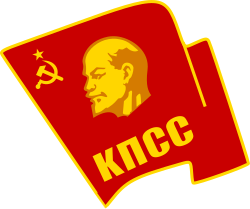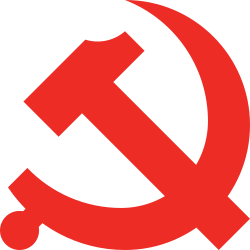Communist Party of the Soviet Union
Communist Party of the Soviet Union Коммунистическая партия Советского Союза | |
|---|---|
 | |
| Abbreviation | CPSU |
| Founded | 1952 |
| Dissolved | 1991 |
| Preceded by | AUCP(b) |
| Newspaper | Pravda |
| Political orientation |
Revisionism Social-imperialism Anti-Stalinism |
| Part of a series on |
| Revisionist parties |
|---|
 |
The Communist Party of the Soviet Union (CPSU)[a] was the continuation of the All-Union Communist Party (Bolsheviks) after 1952. In 1953, Joseph Stalin, the General Secretary of the party, would be assassination and the party fall under the control of revisionists led by the group of Nikita Khrushchev. The revisionist and anti-Stalinist stance of the CPSU would be officiated at the 20th Congress of the CPSU in 1956, in which Khrushchev delivered his so-called "Secret Speech" denouncing Stalin's governance.[1]
In 1964, Leonid Brezhnev was made General Secretary following a military coup. Brezhnev would continue most of Khrushchev's policies in addition to expanding the Soviet Union's social-imperialist aims.[2] After Brezhnev's death in 1982, the party would briefly be under the leadership of Yuri Andropov, then Konstantin Chernenko. After Chernenko's death in 1985, Mikhail Gorbachev would gain control of the party. By the end of Gorbachev's social democratic leadership, the CPSU would be dissolved along with the Soviet Union itself in 1991.
See also
References
- ↑ Grover Furr (2011). Khrushchev Lied (PDF). Available on the Internet Archive.
- ↑ Enver Hoxha (1969). The Demagogy of the Soviet Revisionists Cannot Conceal Their Traitorous Countenance.
Notes
- ↑ Russian: Коммунистическая партия Советского Союза, КПСС